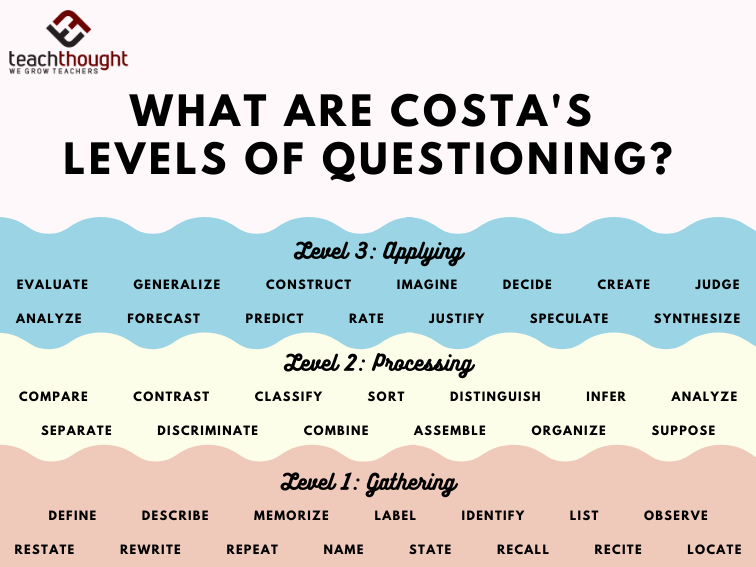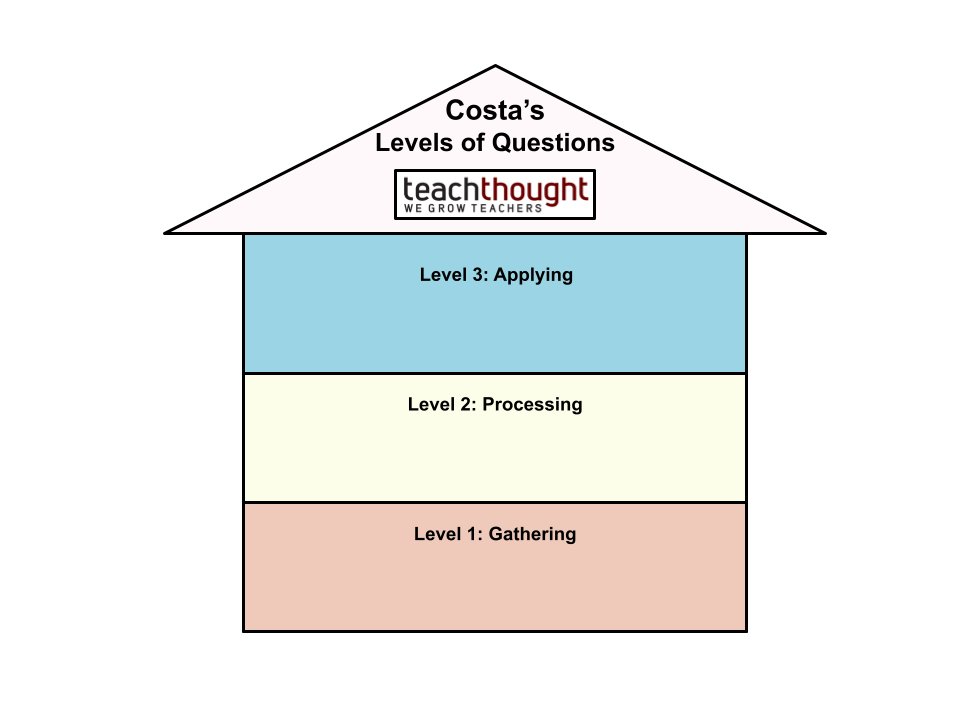

Costa’s Degrees of Questioning– developed by educational researcher Art Costa– include 3 rates of questioning designed to promote higher-level thinking and inquiry.
Similar to Blossom’s taxonomy , Costa’s lower level prompts students to utilize even more basic professors; as pupils move up in levels, the concerns trigger them to use even more complex thinking abilities. Through decades of study on human resilience, Dr. Costa also recognized the 16 Practices of Mind , a collection of habits that sustain students in navigating the difficulties that commonly happen in institution and life, in general. Several of Dr. Costa’s 16 routines– believing interdependently, innovating, gathering information, and applying previous knowledge to brand-new situations– both call for and reinforce higher degrees of questioning.
There is a substantive quantity of study that sustains Dr. Costa’s schema. Newmann (1993 found that higher-order assuming compels students to “manipulate details and ideas in manner ins which transform their definition,” and “anticipates trainees to solve problems and develop implying for themselves,” which straightens with a constructivist view of education and learning
Costa’s Degrees of Examining are generally shown making use of the allegory of a residence with three floorings:


Level 1: Collecting
Level 1 questions mainly need pupils to collaborate with info ‘on the page.’ Answers to level 1 questions are generally literal; definition, a trainee can actually point to the response on a web page.
We have actually previously blogged about Flower’s Taxonomy power verbs , so you can predict that Costa’s degrees have their own set of power verbs, too. Below are a couple of that you may find at the beginning of Degree 1 inquiries:
- Specify
- Describe
- Remember
- Label
- Determine
- Listing
- Observe
- Restate
- Reword
- Repeat
- Name
- State
- Remember
- State
- Locate
- Select
- Suit
- Show
Degree 1 concerns by content location might resemble these instances:
- Scientific research : Label the components of a pet cell.
- Math : State the formula for locating the volume of a cylinder.
- History : Match the name of the emperor to their respective nation.
- English Language Arts : Find the place in the story where the climax happens.
You can see exactly how the majority of these Level 1 power verbs require trainees to remember details, which is an essential skill in its very own right. Nevertheless, educators must strive for the majority of their questions to drop in Degree 2 or 3, which test trainees to use higher-order reasoning abilities.
Level 2: Processing
Level 2 inquiries go a step even more than Level 1, motivating trainees to process information by ‘reading in between the lines.’ While pupils may require to use actual info to create their feedbacks, Level 2 requires them to refine that details with what they currently know in order to make brand-new connections.
Here are some examples of Degree 2 power verbs:
- Compare
- Comparison
- Classify
- Sort
- Distinguish
- Infer
- Examine
- Separate
- Differentiate
- Combine
- Put together
- Arrange
- Suppose
Level 2 questions by content location could show up in the complying with ways:
- Science : Contrast the processes of mitosis and meiosis.
- Mathematics : Categorize the geometric shapes according to their variety of sides and angles.
- History : Put together the adhering to historical occasions in the order of relevance, from most to the very least.
- English Language Arts : Analy ze the effect that the author’s tone has on the total meaning of the message.
Can you see just how Degree 2 concerns go a step further than Level 1 Greater than merely spewing info, students take it and ‘do something’ with it. They categorize, make distinctions, and compare/contrast it versus another component to see how it impacts the whole. These type of abilities can stimulate inquisitiveness and build a bridge to the concerns that actually create creativity and higher-level reasoning.
Level 3: Applying
While Degree 1 concerns trigger students to collaborate with input, and Level 2 concerns test them to process that input in order to make new links. Here, pupils engage in the highest-level reasoning skills to create a result. This might arise from making evaluations and analyses, testing options to different issues, or making predictions.
We have actually consisted of some examples of Degree 3 power verbs below:
- Review
- Generalize
- Create
- Visualize
- Make a decision
- Develop
- Judge
- Examine
- Projection
- If/then
- Anticipate
- Price
- Justify
- Hypothesize
- Manufacture
- Construct
- Hypothesize
Degree 3 questions by material location might look like the following:
- Science : Based on information from the last years of storm activity in the southeast united state, anticipate how the frequency of cyclone task will certainly transform in the following ten years.
- Mathematics : Price the probability of a governmental prospect winning the election based on protecting the selecting ballots from the complying with U.S. states: Florida, The Golden State, Virginia, New York City, Illinois.
- Social Studies : Develop a social compact that takes into consideration the effects of globalization and technical innovation in the 21 st century.
- English Language Arts : Develop a disagreement that safeguards or shoots down required employee vaccination plans in the United States.
Whether preparing for discussion-based tasks, project-based discovering, or independent questions, instructors ought to strive to orient the majority of pupil thinking and involvement at Degrees 2 and 3 Analyses that prompt trainees to remember fundamental facts (such as the day of a historic event, or the name of an author, or the formula for a formula) do not actually examine trainees’ ability to use new abilities or details to new contexts. A Degree 2 or 3 inquiry would challenge trainees to make connections with basic details. For example, instead of remembering a mere date, an extra open-ended question would ask pupils to predict, based on the moment in history that a specific event occurred, the likelihood of it recurring, offered a comparable sociopolitical ambience. Along the exact same lines, rather than remembering the names of popular authors, a teacher may challenge pupils to make an argument for just how an author would certainly discuss a specific modern-day concern.
In “A Talk to Teachers,” James Baldwin explained the paradox of education and learning: “As one starts to become aware, one starts to take a look at the society in which [they] are educated.” Level 2 (and mostly, level 3 questions intend to cultivate this sort of reaction in pupils, to create them to tilt their heads, do double-takes, explain discrepancies, disrupt the status quo, identify defects in existing institutions, and develop innovative options for those flaws. These are the concerns that inspire us ahead up with more questions, to consider our reasoning, and to advance– both as people and societies.